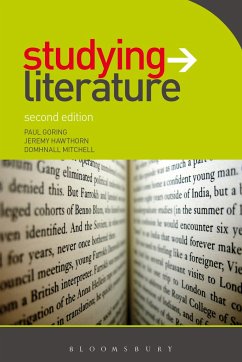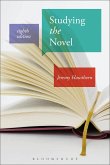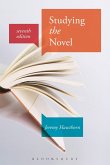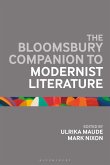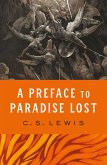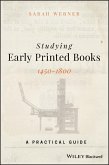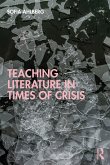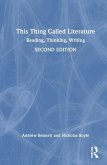Dr Paul Goring, Professor Jeremy Hawthorn, Professor Domhnall Mitchell
Studying Literature
The Essential Companion
Dr Paul Goring, Professor Jeremy Hawthorn, Professor Domhnall Mitchell
Studying Literature
The Essential Companion
- Broschiertes Buch
- Merkliste
- Auf die Merkliste
- Bewerten Bewerten
- Teilen
- Produkt teilen
- Produkterinnerung
- Produkterinnerung
Studying Literature combines practical advice on study skills, from using the library to preparation for exams, with a comprehensive overview of literary theories and theorists. It is an ideal introduction to the subject for university students. New to this edition is a section on how to access and effectively use digital resources.
Andere Kunden interessierten sich auch für
![Studying the Novel Studying the Novel]() Professor Jeremy Hawthorn (Norwegian University Emeritus ProfessorStudying the Novel30,99 €
Professor Jeremy Hawthorn (Norwegian University Emeritus ProfessorStudying the Novel30,99 €![Studying the Novel Studying the Novel]() Professor Jeremy HawthornStudying the Novel37,99 €
Professor Jeremy HawthornStudying the Novel37,99 €![The Bloomsbury Companion to Modernist Literature The Bloomsbury Companion to Modernist Literature]() The Bloomsbury Companion to Modernist Literature45,99 €
The Bloomsbury Companion to Modernist Literature45,99 €![A Preface to Paradise Lost A Preface to Paradise Lost]() C. S. LewisA Preface to Paradise Lost17,99 €
C. S. LewisA Preface to Paradise Lost17,99 €![Studying Early Printed Books, 1450-1800 Studying Early Printed Books, 1450-1800]() Sarah Werner (Folger Shakespeare Library, Washington, DC)Studying Early Printed Books, 1450-180030,99 €
Sarah Werner (Folger Shakespeare Library, Washington, DC)Studying Early Printed Books, 1450-180030,99 €![Teaching Literature in Times of Crisis Teaching Literature in Times of Crisis]() Sofia AhlbergTeaching Literature in Times of Crisis38,99 €
Sofia AhlbergTeaching Literature in Times of Crisis38,99 €![This Thing Called Literature This Thing Called Literature]() Andrew BennettThis Thing Called Literature142,99 €
Andrew BennettThis Thing Called Literature142,99 €-
-
-
Studying Literature combines practical advice on study skills, from using the library to preparation for exams, with a comprehensive overview of literary theories and theorists. It is an ideal introduction to the subject for university students. New to this edition is a section on how to access and effectively use digital resources.
Hinweis: Dieser Artikel kann nur an eine deutsche Lieferadresse ausgeliefert werden.
Hinweis: Dieser Artikel kann nur an eine deutsche Lieferadresse ausgeliefert werden.
Produktdetails
- Produktdetails
- Studying...
- Verlag: Bloomsbury Publishing PLC
- 2nd edition
- Seitenzahl: 432
- Erscheinungstermin: 15. September 2010
- Englisch
- Abmessung: 235mm x 157mm x 28mm
- Gewicht: 728g
- ISBN-13: 9780340985120
- ISBN-10: 0340985127
- Artikelnr.: 29011861
- Herstellerkennzeichnung
- Libri GmbH
- Europaallee 1
- 36244 Bad Hersfeld
- gpsr@libri.de
- Studying...
- Verlag: Bloomsbury Publishing PLC
- 2nd edition
- Seitenzahl: 432
- Erscheinungstermin: 15. September 2010
- Englisch
- Abmessung: 235mm x 157mm x 28mm
- Gewicht: 728g
- ISBN-13: 9780340985120
- ISBN-10: 0340985127
- Artikelnr.: 29011861
- Herstellerkennzeichnung
- Libri GmbH
- Europaallee 1
- 36244 Bad Hersfeld
- gpsr@libri.de
Paul Goring, Jeremy Hawthorn and Domhnall Mitchell
Contents Introduction Introducing your companion Using the companion
Cross-referencing Section 1: Guide to Studying Literature at University
Introduction What type of guide is this? Is such a guide really necessary?
'Literary', 'primary', 'secondary': a note on terminology Getting organised
Your degree scheme Preparing for courses Getting the most from lectures,
seminars and tutorials Using the library Reading literary texts Reading and
studying: general points Reading prose fiction: novels, novellas and short
stories Reading drama Reading poetry Literary criticism What is literary
criticism? How to find relevant criticism Using criticism Writing essays
Analyzing the question Formulating and structuring an argument Applying
literary theory in essays Writing Guidelines on presentation/style
Plagiarism and how to avoid it Making a presentation Exams Preparation and
revision Taking exams Section 2: Guide to the use of electronic resources
Some introductory comments Finding primary electronic information Issues of
reliability Reading in the electronic age Searching and analyzing
electronic texts Finding secondary materials Searching the Internet for
literary resources Evaluating online secondary sources Useful sites
Documenting electronic media Revising and editing electronically Safety
measures Section 3: Theories and approaches Introduction: Living with
theory Molière's Monsieur Jourdain Reinventing the wheel The theoretical
'object' Types of theory Descriptive or prescriptive? Literature-specific?
Butcher or biologist? School or theory? Chosen or thrust-upon? Theory and
method A note on our groupings Formalisms Russian Formalism The Prague
School New Criticism The Hermeneutic tradition Hermeneutics Phenomenology
Reception theory Reader-response criticism Structuralism and its progeny
Structuralism Semiology/semiotics Narratology Post-structuralism
Deconstruction Pragmatics and the reaction against structuralism Speech act
theory Psychological and psychoanalytic theories Psychoanalytic criticism
Archetypal criticism Cognitive criticism 'Isms' Marxist theory and
criticism The Frankfurt School New historicism and cultural materialism
Thing theory Postcolonialism Ecocriticism Feminism Queer theory Section 4:
Guide to literary theorists Mikhail Bakhtin Roland Barthes Simone de
Beauvoir Walter Benjamin Homi K. Bhabha Harold Bloom Bertolt Brecht Hélène
Cixous Jacques Derrida Terry Eagleton Umberto Eco T.S. Eliot William Empson
Stanley Fish Michel Foucault Northrop Frye Henry Louis Gates, Jr Gérard
Genette Sandra Gilbert and Susan Gubar Lucien Goldmann Stephen Jay
Greenblatt E.D. Hirsch Jr bell hooks Luce Irigaray Wolfgang Iser Roman
Jakobson Fredric Jameson Julia Kristeva Jacques Lacan F.R. Leavis Georg
Lukács Jean-François Lyotard Jerome McGann Paul de Man J. Hillis Miller
Kate Millett Franco Moretti James Phelan Vladimir Propp I.A. Richards Paul
Ricoeur Edward Said Ferdinand de Saussure Viktor Shklovsky Elaine Showalter
Gayatri Chakravorty Spivak Tzvetan Todorov René Wellek Raymond Williams
Virginia Woolf Section 5: Glossary of literary and theoretical terms
Bibliography Index
Cross-referencing Section 1: Guide to Studying Literature at University
Introduction What type of guide is this? Is such a guide really necessary?
'Literary', 'primary', 'secondary': a note on terminology Getting organised
Your degree scheme Preparing for courses Getting the most from lectures,
seminars and tutorials Using the library Reading literary texts Reading and
studying: general points Reading prose fiction: novels, novellas and short
stories Reading drama Reading poetry Literary criticism What is literary
criticism? How to find relevant criticism Using criticism Writing essays
Analyzing the question Formulating and structuring an argument Applying
literary theory in essays Writing Guidelines on presentation/style
Plagiarism and how to avoid it Making a presentation Exams Preparation and
revision Taking exams Section 2: Guide to the use of electronic resources
Some introductory comments Finding primary electronic information Issues of
reliability Reading in the electronic age Searching and analyzing
electronic texts Finding secondary materials Searching the Internet for
literary resources Evaluating online secondary sources Useful sites
Documenting electronic media Revising and editing electronically Safety
measures Section 3: Theories and approaches Introduction: Living with
theory Molière's Monsieur Jourdain Reinventing the wheel The theoretical
'object' Types of theory Descriptive or prescriptive? Literature-specific?
Butcher or biologist? School or theory? Chosen or thrust-upon? Theory and
method A note on our groupings Formalisms Russian Formalism The Prague
School New Criticism The Hermeneutic tradition Hermeneutics Phenomenology
Reception theory Reader-response criticism Structuralism and its progeny
Structuralism Semiology/semiotics Narratology Post-structuralism
Deconstruction Pragmatics and the reaction against structuralism Speech act
theory Psychological and psychoanalytic theories Psychoanalytic criticism
Archetypal criticism Cognitive criticism 'Isms' Marxist theory and
criticism The Frankfurt School New historicism and cultural materialism
Thing theory Postcolonialism Ecocriticism Feminism Queer theory Section 4:
Guide to literary theorists Mikhail Bakhtin Roland Barthes Simone de
Beauvoir Walter Benjamin Homi K. Bhabha Harold Bloom Bertolt Brecht Hélène
Cixous Jacques Derrida Terry Eagleton Umberto Eco T.S. Eliot William Empson
Stanley Fish Michel Foucault Northrop Frye Henry Louis Gates, Jr Gérard
Genette Sandra Gilbert and Susan Gubar Lucien Goldmann Stephen Jay
Greenblatt E.D. Hirsch Jr bell hooks Luce Irigaray Wolfgang Iser Roman
Jakobson Fredric Jameson Julia Kristeva Jacques Lacan F.R. Leavis Georg
Lukács Jean-François Lyotard Jerome McGann Paul de Man J. Hillis Miller
Kate Millett Franco Moretti James Phelan Vladimir Propp I.A. Richards Paul
Ricoeur Edward Said Ferdinand de Saussure Viktor Shklovsky Elaine Showalter
Gayatri Chakravorty Spivak Tzvetan Todorov René Wellek Raymond Williams
Virginia Woolf Section 5: Glossary of literary and theoretical terms
Bibliography Index
Contents Introduction Introducing your companion Using the companion
Cross-referencing Section 1: Guide to Studying Literature at University
Introduction What type of guide is this? Is such a guide really necessary?
'Literary', 'primary', 'secondary': a note on terminology Getting organised
Your degree scheme Preparing for courses Getting the most from lectures,
seminars and tutorials Using the library Reading literary texts Reading and
studying: general points Reading prose fiction: novels, novellas and short
stories Reading drama Reading poetry Literary criticism What is literary
criticism? How to find relevant criticism Using criticism Writing essays
Analyzing the question Formulating and structuring an argument Applying
literary theory in essays Writing Guidelines on presentation/style
Plagiarism and how to avoid it Making a presentation Exams Preparation and
revision Taking exams Section 2: Guide to the use of electronic resources
Some introductory comments Finding primary electronic information Issues of
reliability Reading in the electronic age Searching and analyzing
electronic texts Finding secondary materials Searching the Internet for
literary resources Evaluating online secondary sources Useful sites
Documenting electronic media Revising and editing electronically Safety
measures Section 3: Theories and approaches Introduction: Living with
theory Molière's Monsieur Jourdain Reinventing the wheel The theoretical
'object' Types of theory Descriptive or prescriptive? Literature-specific?
Butcher or biologist? School or theory? Chosen or thrust-upon? Theory and
method A note on our groupings Formalisms Russian Formalism The Prague
School New Criticism The Hermeneutic tradition Hermeneutics Phenomenology
Reception theory Reader-response criticism Structuralism and its progeny
Structuralism Semiology/semiotics Narratology Post-structuralism
Deconstruction Pragmatics and the reaction against structuralism Speech act
theory Psychological and psychoanalytic theories Psychoanalytic criticism
Archetypal criticism Cognitive criticism 'Isms' Marxist theory and
criticism The Frankfurt School New historicism and cultural materialism
Thing theory Postcolonialism Ecocriticism Feminism Queer theory Section 4:
Guide to literary theorists Mikhail Bakhtin Roland Barthes Simone de
Beauvoir Walter Benjamin Homi K. Bhabha Harold Bloom Bertolt Brecht Hélène
Cixous Jacques Derrida Terry Eagleton Umberto Eco T.S. Eliot William Empson
Stanley Fish Michel Foucault Northrop Frye Henry Louis Gates, Jr Gérard
Genette Sandra Gilbert and Susan Gubar Lucien Goldmann Stephen Jay
Greenblatt E.D. Hirsch Jr bell hooks Luce Irigaray Wolfgang Iser Roman
Jakobson Fredric Jameson Julia Kristeva Jacques Lacan F.R. Leavis Georg
Lukács Jean-François Lyotard Jerome McGann Paul de Man J. Hillis Miller
Kate Millett Franco Moretti James Phelan Vladimir Propp I.A. Richards Paul
Ricoeur Edward Said Ferdinand de Saussure Viktor Shklovsky Elaine Showalter
Gayatri Chakravorty Spivak Tzvetan Todorov René Wellek Raymond Williams
Virginia Woolf Section 5: Glossary of literary and theoretical terms
Bibliography Index
Cross-referencing Section 1: Guide to Studying Literature at University
Introduction What type of guide is this? Is such a guide really necessary?
'Literary', 'primary', 'secondary': a note on terminology Getting organised
Your degree scheme Preparing for courses Getting the most from lectures,
seminars and tutorials Using the library Reading literary texts Reading and
studying: general points Reading prose fiction: novels, novellas and short
stories Reading drama Reading poetry Literary criticism What is literary
criticism? How to find relevant criticism Using criticism Writing essays
Analyzing the question Formulating and structuring an argument Applying
literary theory in essays Writing Guidelines on presentation/style
Plagiarism and how to avoid it Making a presentation Exams Preparation and
revision Taking exams Section 2: Guide to the use of electronic resources
Some introductory comments Finding primary electronic information Issues of
reliability Reading in the electronic age Searching and analyzing
electronic texts Finding secondary materials Searching the Internet for
literary resources Evaluating online secondary sources Useful sites
Documenting electronic media Revising and editing electronically Safety
measures Section 3: Theories and approaches Introduction: Living with
theory Molière's Monsieur Jourdain Reinventing the wheel The theoretical
'object' Types of theory Descriptive or prescriptive? Literature-specific?
Butcher or biologist? School or theory? Chosen or thrust-upon? Theory and
method A note on our groupings Formalisms Russian Formalism The Prague
School New Criticism The Hermeneutic tradition Hermeneutics Phenomenology
Reception theory Reader-response criticism Structuralism and its progeny
Structuralism Semiology/semiotics Narratology Post-structuralism
Deconstruction Pragmatics and the reaction against structuralism Speech act
theory Psychological and psychoanalytic theories Psychoanalytic criticism
Archetypal criticism Cognitive criticism 'Isms' Marxist theory and
criticism The Frankfurt School New historicism and cultural materialism
Thing theory Postcolonialism Ecocriticism Feminism Queer theory Section 4:
Guide to literary theorists Mikhail Bakhtin Roland Barthes Simone de
Beauvoir Walter Benjamin Homi K. Bhabha Harold Bloom Bertolt Brecht Hélène
Cixous Jacques Derrida Terry Eagleton Umberto Eco T.S. Eliot William Empson
Stanley Fish Michel Foucault Northrop Frye Henry Louis Gates, Jr Gérard
Genette Sandra Gilbert and Susan Gubar Lucien Goldmann Stephen Jay
Greenblatt E.D. Hirsch Jr bell hooks Luce Irigaray Wolfgang Iser Roman
Jakobson Fredric Jameson Julia Kristeva Jacques Lacan F.R. Leavis Georg
Lukács Jean-François Lyotard Jerome McGann Paul de Man J. Hillis Miller
Kate Millett Franco Moretti James Phelan Vladimir Propp I.A. Richards Paul
Ricoeur Edward Said Ferdinand de Saussure Viktor Shklovsky Elaine Showalter
Gayatri Chakravorty Spivak Tzvetan Todorov René Wellek Raymond Williams
Virginia Woolf Section 5: Glossary of literary and theoretical terms
Bibliography Index

